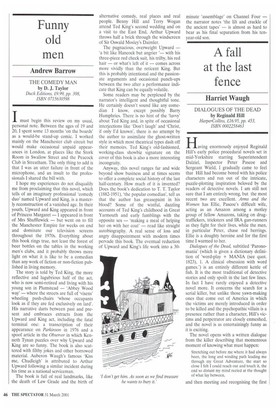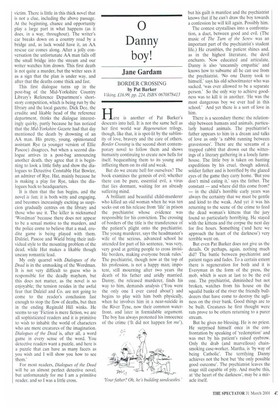A fall at the last fence
Harriet Waugh
DIALOGUES OF THE DEAD by Reginald Hill HatperCollins, £16.95, pp. 453, ISBN 0002258463 Having enormously enjoyed Reginald Hill's early police procedural novels set in mid-Yorkshire starring Superintendent Dalziel, Inspector Peter Pascoe and Sergeant Wield, I gradually came to feel that Hill had become bored with his police• characters and run out of the intricate, puzzle-plotting inspiration beloved by the readers of detective novels. I am still not sure that I am entirely wrong, but the most recent two are excellent. Arms and the Women has Ellie, Pascoe's difficult wife, acting as an Amazon among a motley group of fellow Amazons, taking on drugtraffickers, tricksters and IRA gun-runners as they fight for their lives, while the men, in particular Peter, chase red herrings. Ellie is a doughty heroine and for the first time I warmed to her.
Dialogues of the Dead, subtitled Taronomania' (which is given a dictionary definition of 'word-play + MANIA (see quot. 1823), 1. A clinical obsession with word games.') is an entirely different kettle of fish. It is the most traditional of detective stories and only spoilt in the last few lines. In fact I have rarely enjoyed a detective novel more. It concerns the search for a serial killer, but unlike those yawn-making ones that come out of America in which the victims are merely introduced in order to be killed and the psychopathic villain is a presence rather than a character, Hill's victims and perpetrator are closely enmeshed, and the novel is as entertainingly funny as it is exciting.
The novel opens with a written dialogue from the killer describing that momentous moment of knowing what must happen:
Stretching out before me where it had always been, the long and winding path leading me through my Great Adventure, the start so close I felt I could reach out and touch it, the end so distant my mind reeled at the thought of what lay between,
and then meeting and recognising the first victim. There is little in this thick novel that is not a clue, including the above passage. At the beginning, chance and opportunity play a large part in what happens (as it does, in a way, throughout). The writer's car breaks down on a country road by a bridge and, as luck would have it, an AA rescue car comes along. After a jolly conversation the unfortunate AA man falls off the small bridge into the stream and our writer watches him drown. This first death is not quite a murder, but the writer sees it as a sign that the plan is under way, and after that the deaths come thick and fast.
This first dialogue turns up in the post-bag of the Mid-Yorkshire Country Library's Reference Department's shortstory competition, which is being run by the library and the local gazette. Dick Dee, the erudite and likable head of the reference department, thinks the dialogue interestingly quirky, partly because he has noticed that the Mid-Yorkshire Gazette had that day mentioned the death by drowning of an AA man. His pretty, young, opinionated assistant Rye (a younger version of Ellie Pascoe) disagrees, but when a second dialogue arrives in a post-bag announcing another death, they agree that it is beginning to look a little fishy and show the dialogues to Detective Constable Hat Bowler, an admirer of Rye. Hat, mainly because he is making a play for Rye, takes the dialogues back to headquarters.
It is then that the fun begins, and the novel is fun; it is both witty and engaging, and becomes increasingly exciting as suspicion gradually centres on the library and those who use it. The killer is nicknamed Wordman' because there does not appear to be a sexual motive to the murders, and the police come to believe that a mad, erudite game is being played with them. Dalziel. Pascoe and Wield bring their individual style to the mounting problem of the dead, while Hat makes a likable though uneasy romantic lead.
My only quarrel with Dialogues of the Dead is in the unmasking of the Wordman. It is not very difficult to guess who is responsible for the deadly mayhem, but this does not matter, as the novel is so enjoyable; the tension resides in the awful fear that Dalziel and Co. are not going to come to the reader's conclusion fast enough to stop the flow of deaths, but then in the ending Reginald Hill winks. He seems to say 'Fiction is mere fiction, we are all sophisticated readers and it is primitive to wish to inhabit the world of characters who are mere creatures of the imagination. Dialogues of the Dead is, after all, a word game in every sense of the word. You detective readers want a puzzle, and here is a puzzle that can have as many facets as you wish and I will show you how to see them.'
For most readers, Dialogues of the Dead will be an almost perfect detective novel, but unfortunately for me I am a primitive reader, and so I was a little cross.



























































































 Previous page
Previous page